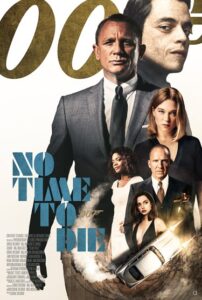 As Daniel Craig exits the role that made him a household name, his final Bond film, No Time to Die, allows us to consider the question of lasting legacies – fictional, literary, and literal.
As Daniel Craig exits the role that made him a household name, his final Bond film, No Time to Die, allows us to consider the question of lasting legacies – fictional, literary, and literal.
Daniel Craig has been portraying super spy James Bond for 16 years – two more than the previous record-holder, Roger Moore. No Time to Die is also the most successful James Bond movie by box office standards. But the idea of legacies plays a large part in the No Time to Die Story story. Most importantly, the audience leaves the theater wondering, “Where does James Bond” go from here?
No Time to Die is directed by Cary Joji Fukunaga and stars Daniel Craig, Léa Seydoux, and Rami Malek. The music is by the always appreciated AYJW “regular,” Hans Zimmer. (Interestingly enough, he is ALSO the music producer for our next episode – Dune.)
The music for No Time to Die was pretty typical for the Bond franchise – neither great nor terrible – simply falling into the Bond music category.
Initial Impressions
First and foremost, No Time to Die seems unique among the Bond franchise due to its exceedingly close connection to the previous entry, 2015’s Spectre. Much of the plot and most of the characters are dependant on knowing the Spectre storyline. Eve was thrown off because she’s not seen Spectre. I was only slightly better off because I had seen it. I just didn’t remember much of anything about it.
One of the things that they did very well was paying homage to the entire history of James Bond, from the opening tunnel shot to the “Bond, James Bond” and the “shaken, not stirred” comments. The end result is a movie that feels very “James Bond” -ish, in a good way. It did not feel like a long movie, even with a 2 hour and 43 minutes run time. The pacing and story beats were well done.
Daniel Craig brought an unexpected quality to the role of James Bond. The previous iterations of the famous agent all seemed too debonair beyond any level of reality. No one could be that smooth all the time. Particularly not after peeling off a wetsuit to reveal a full tuxedo underneath. Daniel Craig, though, brought an “everyman” quality to the role. He was tormented by what he’s done and isn’t perfect all the time. Of course, I will always love Connery and Brosnan as Bond, but I think Daniel Craig added dimensions to the character that I just didn’t see before.
No Time to Die also embraces a bit more of the Flemming-verse MI6 mythology, including introducing another double-0 agent, hinting that Bond is not the center of the universe. I’m not sure why, but I appreciated that.
The movie did hit a few bumps for me, though. A couple of plot elements never seem to achieve their full potential—in particular, the connection between Safin and Madeleine and the SPECTRE link to the other movies. It also seemed to like some of the movie’s humor was “phoned in.” You expect there to be witty banter and snappy comebacks, so they put some in, but they didn’t work hard at it.
I was bothered by one of the main plot points that informed the motivation of the main characters. A nanotech-engineered biotech weapon, once introduced to a person’s system, can never be removed. I just couldn’t buy that they engineered it this way. Of course, an argument could be made for why that might have been the case, but it still got under my skin.
Building Legacies
No Time to Die is all about the legacy. There have been 26 Bond movies. No Time to Die builds on that legacy both within the framework of the fiction and from outside of it. All the characters in the film are looking to build (or live-out) their legacy. James is working on his legacy by trying to settle down with a woman. M seeks to build his legacy by developing the perfect weapon that can be used without ever causing collateral damage. Mathilde is Madeleine’s ultimate legacy. Even Safin is seeking his twisted legacy by pressing the reset button on the world.
While the specific mention of leaving a legacy doesn’t appear in the Bible, we can find the concept in several places. The most crucial point is that the legacy we leave is good news—the Gospel of Christ Jesus. That is the most critical thing we can leave behind for those that live beyond us.
In No Time to Die, MI6 believes James Bond is dead, so they have reassigned the 007 number to a new agent. Even though Bond knows this is how it works, he seems moderately irritated by sharing his agent code with another person. Perhaps he was expecting his number to be retired, like a sports jersey.
Some of the examinations of the legacy in this movie involve changing with the times, as well. Global politics are driving the intelligence communities of the United States and the UK apart more, and Bond finds that he has to adjust to that.
It appears that No Time to Die is laying the groundwork for a significant shift in the Bond legacy. By playing so much homage to the vast history of the franchise and then by ending with an “inescapable death,” it may be that the next film will contain some cataclysmic shift. Only time will tell.
We have several verses that discuss what we store up and what we leave behind:
But store up for yourselves treasures in heaven, where neither moth nor rust destroys, and where thieves don’t break in and steal. For where your treasure is, there your heart will be also. (Matthew 6:20-21)
What you have heard from me in the presence of many witnesses, commit to faithful men who will be able to teach others also. (2 Timothy 2.2)
Just as each one has received a gift, use it to serve others, as good stewards of the varied grace of God. (1 Peter 4.10)
A good man leaves an inheritance to his grandchildren, but the sinner’s wealth is stored up for the righteous. (Proverbs 13:22)
We will not hide them from their children, but will tell a future generation the praiseworthy acts of the Lord, his might, and the wondrous works he has performed. (Psalm 78:4)
All life has value—human life in particular since we are made in the image of God. We are also stewards of that value, and part of the way we care for it is to work towards a world where others will be drawn to Christ. That is the legacy we need to seek.
Weapons of Mass Destruction
The bioweapon of the movie, Heracles, was designed for M as the perfect weapon that the government can use without causing collateral damage. The idea that anyone could develop such a weapon without regard to how it might be misused is something we pray we only ever see in fiction. Once an idea is realized, it will be corrupted. For some reason, though, M and his team didn’t foresee it happening. So even though it’s all fictional, it does worry us. It also reminds us that we need to be vigilant and call on our governments for transparency.
All of humanity is bound by the natural moral law, so one of the ways that Hollywood convinces us that someone is utterly depraved is to have his character ignore the law that is written on their hearts. In No Time to Die, the scientist who developed the nano-virus, Valdo Obruchev, is made this way.
So, when Gentiles, who do not by nature have the law, do what the law demands, they are a law to themselves even though they do not have the law. They show that the work of the law is written on their hearts. Their consciences confirm this. Their competing thoughts either accuse or even excuse them on the day when God judges what people have kept secret, according to my gospel through Christ Jesus. (Romans 2:14-16)
The villain, Lyutsifer Safin, seeks to use the nano-virus to do a “global reset” and believes he is doing good. He compares himself to Bond, believing they are morally equivalent, but that’s not the case. James Bond operates under the authority of a divinely established government, while Safin does not.
For it is God’s servant for your good. But if you do wrong, be afraid, because it does not carry the sword for no reason. For it is God’s servant, an avenger that brings wrath on the one who does wrong. (Romans 13:4)
No Time to Die
There is a mortality theme in the James Bond movie titles, and it is a theme that permeates the movies as well. In No Time to Die, they take it a step further and emphasize on how much time we have to live. Bond is told that he has “time to kill and nothing to live for.” However, shortly after Bond tells his lover that they have all the time in the world, he discovers the hard way that this isn’t true.
For Christians, time and death are different. We have a limited amount of time on this earth, but we look forward to an eternity with Christ.
My eager expectation and hope is that I will not be ashamed about anything, but that now as always, with all courage, Christ will be highly honored in my body, whether by life or by death.
For me, to live is Christ and to die is gain. Now if I live on in the flesh, this means fruitful work for me; and I don’t know which one I should choose. I am torn between the two. I long to depart and be with Christ—which is far better— but to remain in the flesh is more necessary for your sake. Since I am persuaded of this, I know that I will remain and continue with all of you for your progress and joy in the faith, so that, because of my coming to you again, your boasting in Christ Jesus may abound.
Just one thing: As citizens of heaven, live your life worthy of the gospel of Christ. Then, whether I come and see you or am absent, I will hear about you that you are standing firm in one spirit, in one accord, contending together for the faith of the gospel (Philippians 1:20-27)
Believers do necessarily seek to extend their time on earth, but we want to do everything we can to live for Christ while we are here. What better way to do that than to seek to bring others to him, fulfilling the great commission and leaving behind a legacy Christ can be proud of.
Please support the podcast!

Are You Just Watching? is listener supported. Special thanks to our current patrons: Isaias Santillano, Craig Hardee, Stephen Brown II, David Lefton, and Peter Chapman for their generous support. We can't continue to share critical thinking for the entertained Christian without your financial help, so please head on over to our Patreon page and become one of our supporting patrons!
Share your feedback!
What did you think of No Time to Die? We would like to know, even if just your reactions to the trailer or the topics we shared in this episode. Or what general critical-thinking and entertainment thoughts or questions do you have? Would you like to suggest a movie or TV show for us to give a Christian movie review with critical thinking?
- Comment on the shownotes
- Call (513) 818-2959 to leave a voicemail
- Email feedback@AreYouJustWatching.com (audio files welcome)
- Join our Facebook discussion group.
